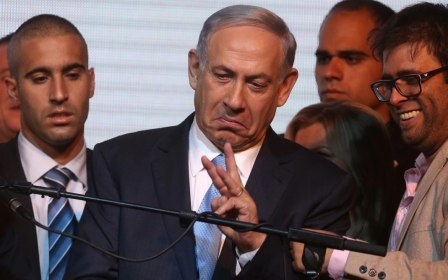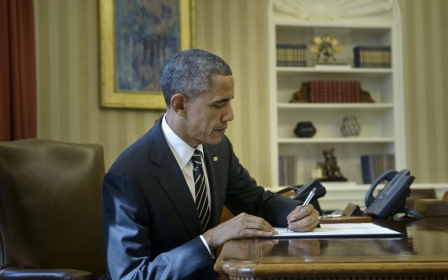White House warns Netanyahu Palestinian 'occupation must end'

The White House on Monday bluntly warned Israel that its occupation of Palestinian land must end, dismissing Prime Minister Benjamin Netanyahu's efforts to take back controversial campaign pledges.
In unusually tough language that underscores the fracture in relations between Washington and Israel, White House Chief of Staff Denis McDonough said "an occupation that has lasted for almost 50 years must end."
McDonough criticized Netanyahu's pre-election pledge to block the creation of a Palestinian state - the supposed end goal of decades of fruitless peace talks - and he questioned Netanyahu's efforts to undo the damage.
"We cannot simply pretend that those comments were never made, or that they don't raise questions about the Prime Minister's commitment to achieving peace through direct negotiations," he said.
"The Palestinian people must have the right to live in and govern themselves in their own sovereign state," he added.
McDonough is one of President Barack Obama's closest advisors, and his speech to the liberal pro-Israel lobby group J Street was followed closely in Washington.
Netanyahu's pledge deepened a long-running disagreement with Obama but his top aide said, the row was not based on "personal pique".
"America's commitment to a two-state solution is fundamental to US foreign policy," McDonough said. "It's been the goal of both Republican and Democratic presidents, and it remains our goal today."
The White House press secretary Josh Earnest also slammed the stunning public renouncement of peace efforts, saying Washington would have to reevaluate its own position.
“The statements that we have made over the last week about the need to reevaluate US policy is actually predicated on Prime Minister Netanyahu's comments that legitimately call into question his commitment to a two-state solution,” Earnest told reporters.
“Now there's legitimate doubt about the commitment of our ally in those negotiations to participating in those talks. So it certainly calls into question what our policy can be if our ally is, at best, reluctant to participate in those conversations,” he said.
David Makovsky a fellow at the The Washington Institute said that the rift was genuine and unlikely to glossed over soon, especially due to the ongoing tensions over the Iranian nuclear talks. The talks have been a cornerstone of Obama's foreign policy bt have been firmly resisted by Israel.
"Immediately after the election, the prime minister insisted that he remained committed to two states, but President Obama chose to believe that his election remarks were more authentic than his clarification, in keeping with his well-known doubts about Netanyahu's support for that goal," Makovsky wrote.
"While pledging not to touch US-Israeli military or intelligence cooperation, Obama told the Huffington Post on Friday that he took Netanyahu ‘at his word’ that a Palestinian state will not happen during his tenure, and that Washington needed to evaluate all other options to avoid chaos."
Palestinian citizens of Israel
On Monday, Netanyahu also apologized for election day comments claiming Arabs were voting in "droves," comments which also brought US criticism.
He met with Israel’s Palestinian Arab representatives to calm the atmosphere in Palestinian Arab towns and villages within Israel, as well as to ease international criticism, especially from US PresidentBarack Obama, to his statements.
“I know the things I said a few days ago hurt some Israeli citizens,” Netanyahu said. “That was not my intention and I am sorry.”
“My actions as prime minister, including massive investments in minority sectors, prove the exact opposite,” he continued. “I think, similarly, that no element outside the state of Israel should intervene in our democratic processes.”
“I see myself as the prime minister of each and every one of you, of all Israeli citizens without differentiating between religions, races, and sex. I see in all Israeli citizens partners in building the state of Israel, one that is thriving and safe for all Israeli citizens.”
He has also tried to downplay his pledge to oppose a two-state solution, insisting Israel's policy has not changed.
For their part, the Joint List - a coalition made up of Arab factions that became the third largest party with 13 Knesset seats won in the recent election - rejected Netanyahu’s apology, saying that he is paving the way for more “racist and marginalising legislation” in the next Israeli parliament.
They also called on Netanyahu to “give back the Knesset seat he got based on incitement and fear”.
“Netanyahu read out a type of apology, although the word “apologize” was not used, Haaretz’s diplomatic correspondent Barak Ravid wrote in an op-ed published on Tuesday.
“He didn't apologize for the outrageous statements he made on election day, but merely expressed regret for the fact that his words had insulted Israeli Arabs. Immediately afterward he began praising himself for the investments he had made in the minority sector.”
“The contrast between the unrestrained campaign on Election Day and the forced, weak apology a week later was quite upsetting. It was like publishing a one-column-inch apology on the obituary page for deliberately libelling a person on Page one. It left a sour impression of wanting to get away with the minimum necessary,” Ravid added.
New MEE newsletter: Jerusalem Dispatch
Sign up to get the latest insights and analysis on Israel-Palestine, alongside Turkey Unpacked and other MEE newsletters
Middle East Eye delivers independent and unrivalled coverage and analysis of the Middle East, North Africa and beyond. To learn more about republishing this content and the associated fees, please fill out this form. More about MEE can be found here.




